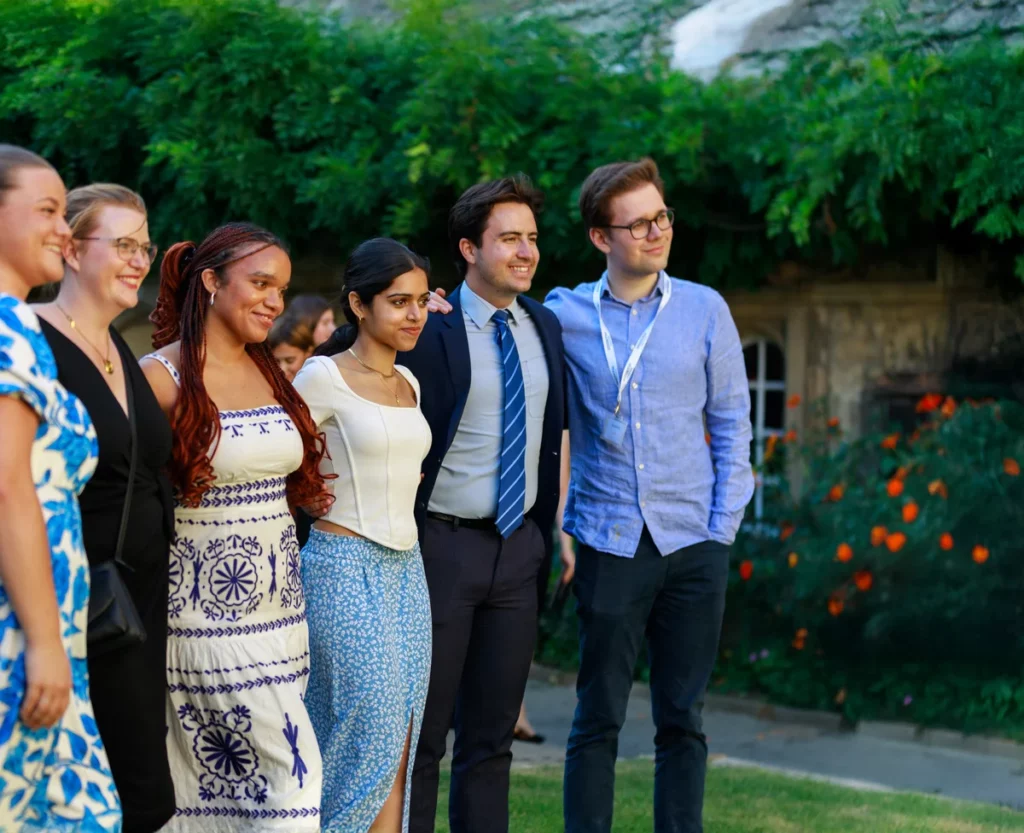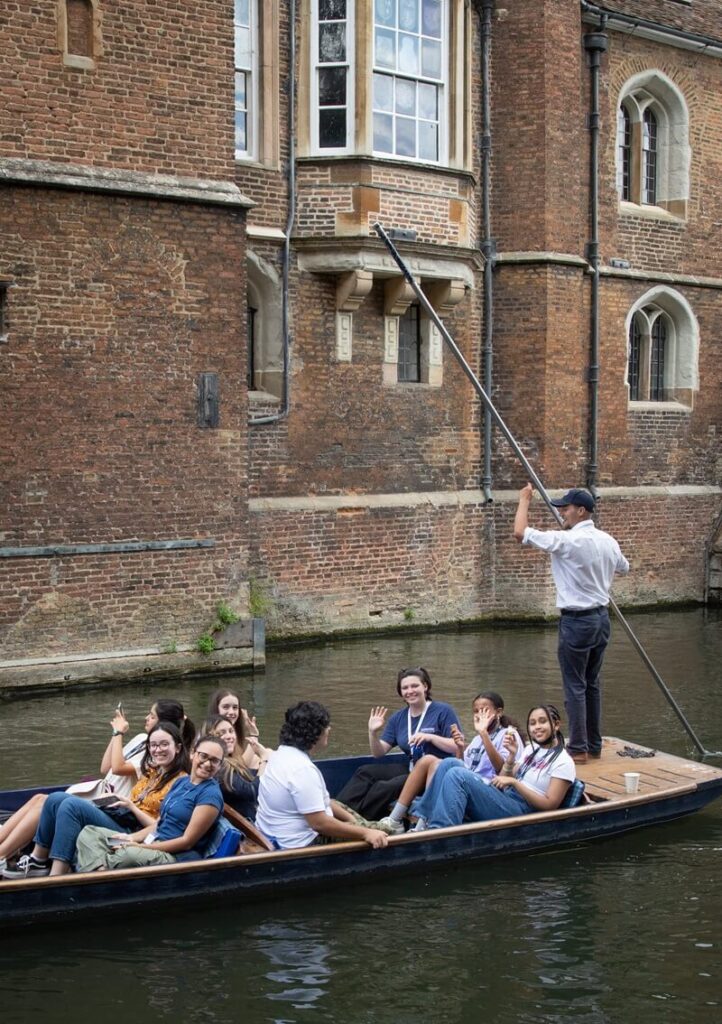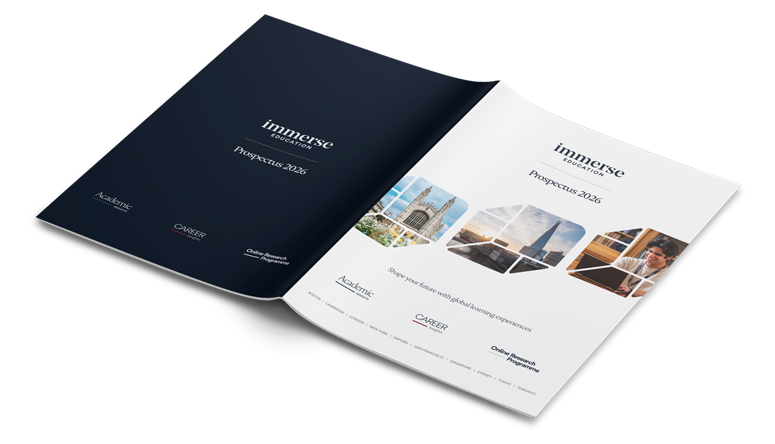Attending a Cambridge University summer school is a transformative opportunity.
Not only do you gain access to world-class tutors and inspiring academic sessions, but you also step into an environment designed to spark curiosity, confidence, and ambition.
With so many subjects on offer, from Artificial Intelligence and Medicine to Creative Writing and International Relations, the challenge isn’t finding something exciting. Instead, the real challenge is deciding what’s right for you.
This guide will help you choose a subject that aligns with your passions, academic strengths, and future aspirations.
Step 1: Decide Between Familiar and New Subjects
The first decision to make is whether to dive deeper into a subject you already study at school, or explore something entirely fresh. Both approaches have benefits:
Approach 1: Honing in on a favourite subject
If you already excel in Mathematics, Biology, or English Literature, choosing that subject allows you to stretch yourself further.
You’ll access advanced material beyond the school syllabus, guided by expert university tutors who can help you master complex ideas.
As a result, this path can boost your confidence, give you a taste of undergraduate-level study, and enhance your university applications.
Approach 2: Exploring something new
The Cambridge University summer school offers subjects you might not yet have encountered, such as Criminology, Nanotechnology, or Female Future Leaders.
Experimenting with something new broadens your horizons, helps you discover hidden interests, and can spark future academic or career directions.
There’s no right or wrong choice; it’s about reflecting on your learning style and what excites you most.
Step 2: Explore the Range of Subjects Available
Immerse’s Cambridge summer school provides an extensive catalogue of programmes for students aged 13–18, and even for young adults up to 30.
These fall into two main categories: Academic Insights and Career Insights, each designed to provide a different type of learning experience.
Academic Insights
Academic Insights provides a taste of university-level learning through subject-focused courses led by expert tutors from Cambridge, Oxford, and other world-leading institutions. These programmes are ideal for students who want to deepen their academic knowledge and strengthen their university applications.
STEM Subjects
Perfect for logical thinkers and problem solvers, STEM subjects develop analytical skills and technical expertise. Options include:
- Artificial Intelligence
- Biology
- Biotechnology
- Chemistry
- Computer Science
- Criminology (bridging science and humanities)
- Economics
- Nanotechnology
- Engineering
- Psychology
- Mathematics
- Physics
- Medicine
STEM subjects often simulate real-world challenges, such as coding AI applications or designing experiments, helping you apply theory in practical ways.
Creative Subjects
If you’re passionate about expression and design, creative subjects allow you to stretch your imagination:
- Creative Writing
- Architecture
These subjects encourage originality and innovation while offering opportunities to build portfolios and gain constructive feedback.
Humanities
Humanities are ideal if you enjoy questioning, analysing, and debating. You can choose from:
- English Literature
- History
- International Relations
- Law
- Philosophy
- Philosophy, Politics & Economics (PPE)
These programmes sharpen critical thinking and communication, which are essential for academic success and future leadership.
Skills-Based Subject
Unique to Immerse Education, Female Future Leaders focuses on leadership, collaboration, and self-confidence.
It’s a chance to explore issues of gender, equality, and empowerment, preparing you to take on future challenges.
Career Insights
Career Insights focuses on real-world learning. It allows students to explore professional fields through hands-on projects, industry visits, and mentorship from experienced professionals. Available subjects include:
- Business Management
- Medicine
- Law
- Engineering
- Creative Industries
- Artificial Intelligence
Step 3: Consider the Details of Each Programme
Once you have a shortlist, look past the headline and evaluate the learning you will actually do. Use this checklist:
1. Tutors
Immerse Education’s Cambridge University summer school programmes are led by academics and practitioners from Cambridge, Oxford, and other world-leading institutions.
Below are examples of tutors you may encounter in some subject areas we offer:
- Biology
• Hannah – Hannah is a DPhil candidate currently studying Medical Science at the John Radcliffe Department of Medicine at the University of Oxford.
• Filip – Filip is a PhD Candidate at the Mitochondrial Biology Unit at the University of Cambridge. - Creative Writing
• Nicholas – Studied Philosophy and Linguistics at Oxford, now pursuing research at King’s College London on language and technology.
• Jessica – English Literature tutor at Lucy Cavendish College, University of Cambridge, with a PhD in English Literature. - Economics
• Lesego – Cambridge Judge Business School MBA, with consulting experience at McKinsey & Company and Bloomberg.
• Itzhak – DPhil candidate in Economics at Oxford, currently tutoring microeconomics at St Hugh’s College. - Engineering
• Pramit – DPhil researcher at the Department of Engineering Science, University of Oxford.
• Dr Robail – Postdoctoral Research Assistant at Oxford, specialising in biomedical image analysis and machine learning. - Female Future Leaders
• Lesego – Consultant at Bloomberg, MBA from Cambridge Judge, with global leadership experience at McKinsey.
• Louis – MSc in Cognitive and Evolutionary Anthropology from the University of Oxford, combining academic insight with leadership coaching. - Philosophy, Politics & Economics (PPE)
• Aiden – Doctor of Philosophy at the University of Cambridge, specialising in epistemology and ethics.
• Cathy – Lecturer at Wadham College, Oxford, teaching Ethics, Political Philosophy, and PPE.
2. Syllabuses
Scan the syllabus or sample timetable to see how ideas progress from fundamentals to application, and which assessments will evidence your growth.
Academic Insights typically blends seminar discussions, practical work and guided independent study in small groups over two weeks. The final syllabus will depend on the expertise of the tutor, but below, we’ve included some examples of topics that can be studied in each summer school programme.
- Biology
Core building blocks in cellular biology, genetics, ecology and evolution, plus scientific writing, virtual or in-person practicals and an individual research project aligned to interests such as medical research, conservation or genetic engineering. - Creative Writing
Genre exploration across fiction, poetry and narrative non-fiction, with workshop drafting, close reading for technique, and a polished portfolio piece at the end. - Economics
Macro and micro frameworks applied to real markets, workshops on policy trade-offs, and a mini project where you analyse an issue and present findings. - Engineering
Foundations in mechanics, materials and electronics move into design challenges and prototyping. Senior groups meet civil, mechanical or electrical problem sets with iterative builds. - Female Future Leaders
Leadership theories, strategic communication and case-based problem solving, paired with a personal impact project that showcases your voice and vision. - Philosophy, Politics & Economics (PPE)
Interleaved philosophy, politics and economics seminars that connect ideas about the state, institutions and markets, often culminating in a case study or position paper.
What to look for: a clearly sequenced syllabus, authentic tasks you can cite in statements or interviews, and a final artefact, for example, a research paper, a design prototype or a writing portfolio.
3. Reviews and testimonials
Use peer feedback to gauge stretch, support and community. 97% of Immerse’s 20,000+ participants would recommend the programmes, with many citing a confidence boost for university applications and clearer direction after two weeks.
Prioritise reviews that mention the quality of feedback, how accessible tutors were, and concrete skills gained, for example, code repos, lab write-ups, essays or portfolio pages.
Join the Immerse Education 2025 Essay Competition
Follow the instructions to write and submit your best essay for a chance to be awarded a 100% scholarship.

Step 4: Reflect on Your Goals
Choosing a subject is not only about what sounds exciting today. It is about positioning yourself for your next step.
University preparation
Pick the subject that builds credible evidence for your degree goals and strengthens your personal statement.
- Biology
Builds evidence for courses such as Medicine, Natural Sciences, Biomedical Science, or Environmental Science, while also preparing you for careers in medical research, biotechnology, and conservation. - Creative Writing
Builds evidence for courses such as English Literature, Creative Writing, Journalism, or Film Studies, while also preparing you for careers in publishing, media, and the creative industries. - Economics
Builds evidence for courses such as Economics, Philosophy, Politics & Economics (PPE), Business Management, or Finance, while also preparing you for careers in consulting, banking, and public policy. - Engineering
Builds evidence for courses such as Civil Engineering, Mechanical Engineering, Electrical Engineering, or Computer Engineering, while also preparing you for careers in design, technology, and applied sciences. - Female Future Leaders
Builds evidence for courses such as Business Management, International Relations, PPE, or Law, while also preparing you for leadership roles in any industry by strengthening confidence, teamwork, and influence. - Philosophy, Politics & Economics (PPE)
Builds evidence for courses such as Philosophy, Politics & Economics, Law, International Relations, or Social Sciences, while also preparing you for careers in law, government, and international organisations.
If you want extra academic proof points, add the Online Research Programme to produce a university-style paper with Oxbridge or Ivy League mentorship. Accredited options can carry recognised credit, which strengthens applications.
Career exploration
Use the two weeks to “test drive” realistic tasks from fields you are considering.
- Medicine
Study in the city where DNA’s structure was discovered and stem cell research advanced. Visit clinical settings, explore anatomy and diagnostics, and see how science meets real-world healthcare. - Law
Experience Cambridge’s legacy of legal thought through mock trials, firm visits, and ethical debates. Learn how laws shape society and what it takes to build a persuasive legal case. - Engineering
Take on hands-on challenges and industry visits in a city known for innovation. Work with mentors and explore civil, mechanical, and electrical fields through practical design tasks. - Creative Industries
Explore design, media, and marketing through creative workshops. Build storytelling, branding, and presentation skills that prepare you for modern creative careers. - Business Management
Develop leadership, marketing, and strategic thinking in Cambridge’s entrepreneurial hub. Work on real-world business cases and learn from industry professionals. - Artificial Intelligence
Discover machine learning, ethics, and real-world AI applications in a city leading digital innovation. Gain insight into how technology shapes the future across industries.
If you want more industry contact, consider a Career Insights pathway in a global city for expert workshops and site visits, while retaining subject depth.
Personal growth
Even if the subject is not your eventual degree, focus on the transferable skills you will take with you.
- Communication: Workshop discussions, essays and presentations in Creative Writing, PPE, Biology and Economics build clarity and persuasion.
- Quantitative reasoning: Engineering, Mathematics, Physics, and Economics improve modelling and data literacy.
- Collaboration and leadership: Group projects across subjects build teamwork. Female Future Leaders develops confidence, influence and strategic thinking.
- Independent learning: Every Academic Insights programme provides around forty hours of structured learning with personalised feedback in small classes, which accelerates your growth and readiness for university
Step 5: Practical Considerations
When deciding what to study, keep logistics in mind:
- Programme Dates and Age Groups: Cambridge offers sessions from late June to mid-August, with programmes tailored for ages 13–15, 16–18, and 18–30.
- Fees: The two-week Cambridge Academic Insights programme is priced at £7,495 (residential) or £5,995 (non-residential).
- Location: Being in Cambridge means you’ll study in a historic setting surrounded by world-leading university facilities. The environment itself is motivating.
FAQs
Can I choose more than one subject at the Cambridge University summer school?
Most programmes focus on one subject to allow in-depth study, but you can attend different sessions across the summer if you’d like to explore more than one area.
Do I need prior experience in a subject to join?
No. Many programmes are designed to welcome beginners as well as advanced learners. Tutors adapt sessions to your level and provide personalised feedback.
Is this a summer school for under-18s only?
No. While many participants are aged 13–18, there are dedicated Cambridge summer courses for ages 18–30.
Are there certificates awarded at the end of the programme?
Yes. You’ll receive a certificate of achievement, which can support university applications and demonstrate your commitment to learning.
Conclusion
Choosing what to study at a Cambridge University summer school is an exciting step toward shaping your academic and personal future.
Start by deciding whether you want to strengthen a subject you already love or explore something completely new.
By making an informed choice, you’ll not only enjoy two weeks of world-class learning but also equip yourself with the clarity, confidence, and skills to pursue your ambitions.
If you’re ready to take the next step, visit our Cambridge University summer school page and see the full range of available programmes and find the subject that’s right for you.



















